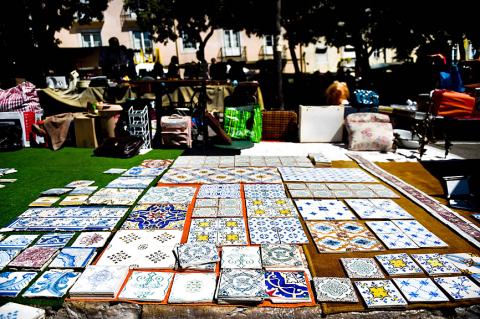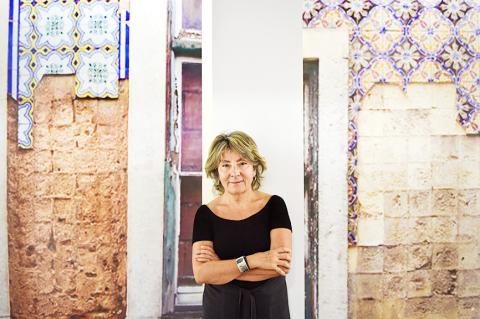Gaping holes on the crumbling walls of an abandoned palace in the heart of Lisbon mark where decorative ceramic tiles have been yanked off, to the displeasure of passing tourists.
Thieves are swiping the elaborately painted tiles, which cover buildings across Portugal, to sell them on the black market. Just one of these tiles, called azulejos, can fetch thousands of euros.
Abandoned buildings like the 17th century Pombal Palace, are especially vulnerable.

Photo: AFP
This was once the family home of the Marquis de Pombal, the statesman who rebuilt Lisbon after a massive earthquake devastated the city in 1755. Owned by Lisbon’s cash-strapped city hall for the last five decades, it has fallen into ruin due to lack of maintenance.
Since a cultural association, Carpe Diem, moved out at the end of last month, the palace has been empty.
“SOS Azulejo,” a project set up by police in 2007 to stop antique dealers from selling stolen Portuguese tiles, includes it on its list of “high risk” buildings.

Photo: AFP
Tile thefts have plunged by 80 percent since the project was set up, said Leonor Sa, the head of Portugal’s police museum, which displays recovered stolen tiles, adding that a huge amount of thefts go unreported.
“The Portuguese do not file complaints because for them they are the most banal thing in the world. They live surrounded by tiles since their birth until their death,” Sa said. “Foreign tourists who discover these ceramics love them because they don’t have them at home.”
Sa, who has a doctorate in cultural studies, gave birth to her two daughters, Rita and Joana, at a Lisbon hospital decorated in azulejos, where she herself was born 59 years ago.
Azulejos first came to Portugal in the early middle ages when Portugal was under Moorish rule. Although many assume the word is a derivation of azul — Portuguese for “blue,” the color of most tiles — the word is Arabic in origin and comes from az-zulayj, which roughly translates as “polished stone.”
Disgusted at the loss of this unique Portuguese treasure, Sa set up Web site, www.sosazulejo.com, that displays photographs of tiles stolen from churches, hospitals, train stations and other buildings.
It makes it easy to check if a tile on sale at a street market or antique dealer was stolen.
“It’s very dissuasive,” said Sa, who is full of energy and has an intense gaze.
Tile thefts reached peaks of around 10,000 per year in 2001, 2002 and 2006 but “now there are significantly fewer” thefts, she said.
Since 2013 it is illegal in Lisbon to demolish a facade decorated with tiles without the authorization of city officials. Parliament plans to extend the rule to the entire country shortly.
At Lisbon’s rambling Feira da Ladra flea market, or “Thieves’ Market,” old azulejos are on sale for between 5 euros and 100 euros (US$5.90 and US$118).
A giant 18th-century panel made up of brown, gold and green tiles depicting exotic animals and flowers was on sale for 500 euros.
Prices at antique dealers can go even higher, with some azulejos fetching up to 10,000 euros.
Anne Typhagne, a 43-year-old French tour guide, lingers before a display of tiles at the flea market which overlooks the Tagus River.
“Before I bought a lot of them, then I stopped because I am against the theft of Portugal’s heritage,” she said.
Police inspections of tile vendors at the market are frequent.
“When they come, I show all the papers. I sell, I don’t steal,” said Maria Santos, 28, whose small stand teems with ceramic tiles from the 18th and 19th centuries.
While some tiles are recovered from building demolitions, Santos said “often, we don’t really know where they come from.”
Oscar Pinto, the head of the national police division dedicated to crimes involving art, said the majority of tiles that are sold have a “legitimate” origin.
“Sometimes it is the landlords themselves that get rid of them to renovate their homes,” he said at his sparsely decorated office. “But let’s not kid ourselves. A drug addict who sells you 20 azulejos in a plastic bag at 1 euro a piece, there is a strong chance that it was a theft.”
Pinto had gone to the flea market the day before to try, in vain, to recover more than 1,000 18th-century ceramic tiles pulled down overnight from an abandoned building in Lisbon’s riverside Baixa district.
The Portuguese capital’s tourism boom “could contribute to an upsurge in thefts,” he said.
Ceramics maker Cristina Pina, 55, thinks she has found a solution to stop tourists from buying old tiles — she has set up a small shop near the market that sells reproductions of azulejos made in the 18th century.
“I prefer it if tourists buy beautiful reproductions of azulejos as souvenirs of Lisbon, which will allow the originals to remain in the country,” she said.

VAGUE: The criteria of the amnesty remain unclear, but it would cover political violence from 1999 to today, and those convicted of murder or drug trafficking would not qualify Venezuelan Acting President Delcy Rodriguez on Friday announced an amnesty bill that could lead to the release of hundreds of prisoners, including opposition leaders, journalists and human rights activists detained for political reasons. The measure had long been sought by the US-backed opposition. It is the latest concession Rodriguez has made since taking the reins of the country on Jan. 3 after the brazen seizure of then-Venezuelan president Nicolas Maduro. Rodriguez told a gathering of justices, magistrates, ministers, military brass and other government leaders that the ruling party-controlled Venezuelan National Assembly would take up the bill with urgency. Rodriguez also announced the shutdown

Civil society leaders and members of a left-wing coalition yesterday filed impeachment complaints against Philippine Vice President Sara Duterte, restarting a process sidelined by the Supreme Court last year. Both cases accuse Duterte of misusing public funds during her term as education secretary, while one revives allegations that she threatened to assassinate former ally Philippine President Ferdinand Marcos Jr. The filings come on the same day that a committee in the House of Representatives was to begin hearings into impeachment complaints against Marcos, accused of corruption tied to a spiraling scandal over bogus flood control projects. Under the constitution, an impeachment by the

Exiled Tibetans began a unique global election yesterday for a government representing a homeland many have never seen, as part of a democratic exercise voters say carries great weight. From red-robed Buddhist monks in the snowy Himalayas, to political exiles in megacities across South Asia, to refugees in Australia, Europe and North America, voting takes place in 27 countries — but not China. “Elections ... show that the struggle for Tibet’s freedom and independence continues from generation to generation,” said candidate Gyaltsen Chokye, 33, who is based in the Indian hill-town of Dharamsala, headquarters of the government-in-exile, the Central Tibetan Administration (CTA). It

A Virginia man having an affair with the family’s Brazilian au pair on Monday was found guilty of murdering his wife and another man that prosecutors say was lured to the house as a fall guy. Brendan Banfield, a former Internal Revenue Service law enforcement officer, told police he came across Joseph Ryan attacking his wife, Christine Banfield, with a knife on the morning of Feb. 24, 2023. He shot Ryan and then Juliana Magalhaes, the au pair, shot him, too, but officials argued in court that the story was too good to be true, telling jurors that Brendan Banfield set